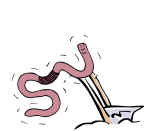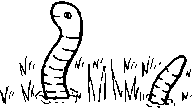|
|
|
|||||
|
|
||||||
|
||||||||||
|
Fast Growing Trees Fastest
Deciduous |
|
Faster
Deciduous |
|
Fast
Deciduous
Evergreen |
|
Fast Growing
Hedging Plants
Deciduous
Evergreen
Arborvitae
Douglas Fir |
|
|
I Like... Worms |
|
Connected pages I like worms | I like conifers | I like my shed | I like climbers | I like junk | celebration trees | Plants |
|
|
Not all worms mind, those in the genus Lumbricus to be precise, the common earthworm. Charles Darwin spent years writing a whole book about them that ended up hundreds of pages long ("The Formation of Vegetable Mould Through the Action of Worms") so there must be something more to them than meets the eye.
 Worms have
helped keep our agricultural system going for centuries. They are a slow silent
plough that turns the soil over. They bring down organic matter from the surface
of the soil and mix it with what lies below. They smooth the landscape. England's
green and pleasant land with verdant rolling pastures is in no short measure due
to the work over countless years of countless earthworms (and the same for Scotland,
Wales and Ireland too).
Worms have
helped keep our agricultural system going for centuries. They are a slow silent
plough that turns the soil over. They bring down organic matter from the surface
of the soil and mix it with what lies below. They smooth the landscape. England's
green and pleasant land with verdant rolling pastures is in no short measure due
to the work over countless years of countless earthworms (and the same for Scotland,
Wales and Ireland too).
The presence of worms is an indication of a healthy soil. Worms have far too much self respect to live in gooey organic deficient muck (muck as in rubbish, not proper muck as in manure - they love that). As well as enriching the soil and mixing it worms also aerate it with their movements and the burrows that they dig.
There are some poor deluded souls who apply vermicides (worm killing chemicals) to actually get rid of their worms. They consider the casts unsightly. Worm casts indicate healthy and active worms, your soil couldn't have a better conditioner. The soil that makes up worm casts is the finest graded material you could ever wish for. Old recipes for seed compost advise adding worm casts, an excellent idea if an awful lot of work going around and gathering them.
 If you
have worm casts on your lawn and don't want them, then don't reach for the chemicals
- invest in a besom. A traditional birch broom like a witches broomstick, use it
to scatter the casts, you could just use a bamboo cane or even your foot. But
please don't damage the worms, they really are your garden's friend. It's just a
shame that they're not cute and furry with big soulful eyes.
If you
have worm casts on your lawn and don't want them, then don't reach for the chemicals
- invest in a besom. A traditional birch broom like a witches broomstick, use it
to scatter the casts, you could just use a bamboo cane or even your foot. But
please don't damage the worms, they really are your garden's friend. It's just a
shame that they're not cute and furry with big soulful eyes.
Worm Info

![]() Worms are the great recyclers. It has been estimated that if there was no
natural decay, then since Elizabethan times the world would be about 1 kilometre
deep in dead leaves and faeces!
Worms are the great recyclers. It has been estimated that if there was no
natural decay, then since Elizabethan times the world would be about 1 kilometre
deep in dead leaves and faeces!
![]() Worms will only start on your compost heap after the initial heating phase is over.
They couldn't survive in the temperatures that are initially reached by the action
of bacteria and fungi, but will finish off the compost admirably to give a rich
brown crumbly end result (as long as it's not a sticky horrible mess - see "how
to make compost that would gladden the hearts of a worm"
Worms will only start on your compost heap after the initial heating phase is over.
They couldn't survive in the temperatures that are initially reached by the action
of bacteria and fungi, but will finish off the compost admirably to give a rich
brown crumbly end result (as long as it's not a sticky horrible mess - see "how
to make compost that would gladden the hearts of a worm"
![]() Worms have 5 pairs of hearts.
Worms have 5 pairs of hearts.
![]() Good healthy worm friendly soil can have up to 700 worms per square meter.
Good healthy worm friendly soil can have up to 700 worms per square meter.
![]() Earthworms
comprise a major food source of many animals for example moles, foxes, badgers
and thrushes.
Earthworms
comprise a major food source of many animals for example moles, foxes, badgers
and thrushes.
![]() If you accidentally chop a worm in two while working in the garden, you
get two dead bits (after the nerves have stopped firing) and not two new worms.
If you can bring yourself to do it, put these chopped bits on the surface so that
the birds watching you can eat them.
If you accidentally chop a worm in two while working in the garden, you
get two dead bits (after the nerves have stopped firing) and not two new worms.
If you can bring yourself to do it, put these chopped bits on the surface so that
the birds watching you can eat them.
![]() Soil churning can be demonstrated by placing earthworms in a container
that has the bottom half filled with sand and the upper half with potting soil.
Five worms will thoroughly mix 500 ml of sand with 500 ml of soil within several
months. Give them some dead leaves to eat and keep the mix moist.
Soil churning can be demonstrated by placing earthworms in a container
that has the bottom half filled with sand and the upper half with potting soil.
Five worms will thoroughly mix 500 ml of sand with 500 ml of soil within several
months. Give them some dead leaves to eat and keep the mix moist.
![]() Captive worms have been known to live for 6 years, though wild ones probably
don't fare any where near as well. They reach sexual maturity after 6 to 12 months.
Captive worms have been known to live for 6 years, though wild ones probably
don't fare any where near as well. They reach sexual maturity after 6 to 12 months.
|
|
|
About us. General queries and emails to |
|
Copyright © Paul Ward 2000 - 2012 |